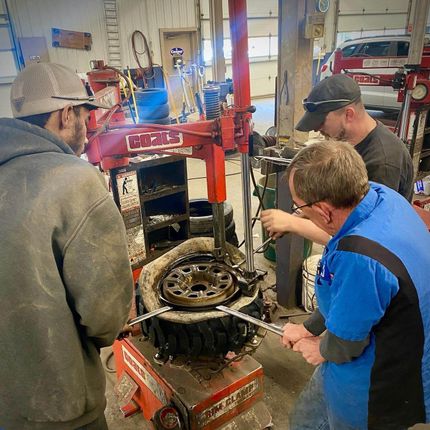Drive with Confidence: GMC Tires Service at Morris Tires
Drive with Confidence: GMC Tires Service at Morris Tires
Blog Article
Tire Service: The Effect of Climate Condition
When it comes to guaranteeing optimal efficiency and safety when driving, understanding the impact of climate condition on tire solution is critical. From scorching warmth to icy roadways, each weather condition component can significantly influence tire capability and general driving experience. By diving right into the effects of varying weather condition conditions on tires, drivers can gain useful understandings that might enhance their car's performance and durability. In this conversation, we will certainly explore the elaborate partnership between weather condition problems and tire service, losing light on the significance of weather-specific tire upkeep methods and considerations.
Warmth and Tire Performance
When revealed to high temperature levels, tires experience adjustments in efficiency that can considerably impact automobile safety and handling. The warm generated from extended driving or warm weather condition conditions creates the tire rubber to soften, leading to reduced tread life and raised wear. As the rubber comes to be softer, the tire's grasp when driving lessens, influencing stopping ranges and general traction. In severe situations, excessive warm can also cause tire blowouts, presenting a severe safety and security danger to the lorry and its occupants.

Winter Impacts
Cold weather condition conditions can have a significant influence on tire performance and safety. As temperatures decrease, tire rubber can harden, leading to lowered grip on icy or snow-covered roads. In winter, tires may additionally lose air stress much more quickly, which can influence managing and fuel performance. Furthermore, cool temperatures can cause tire sidewalls to stiffen, boosting the threat of damages from gaps or various other road dangers.
To minimize the effects of cool weather on tires, it is crucial to consistently examine tire pressure and inflate them to the maker's suggested levels. Utilizing winter season or all-season tires made for chilly climate problems can likewise improve traction and hold on icy or snowy roads. Appropriate tire maintenance, including normal assessments for wear and damage, becomes much more critical during chillier months to ensure optimum efficiency and safety.
Rainy Issues Influence
Tires with worn-out treads are much more prone to hydroplaning, where a layer of water builds up between the tire and the roadway surface, leading to loss of traction. To battle this, vehicle drivers need to frequently check their tires for adequate tread depth and consider spending in tires particularly developed for damp problems.
Moreover, rainy weather condition can also reduce visibility, making it challenging for chauffeurs to see the roadway ahead clearly (GMC Tire Service). In such problems, it is necessary to change driving speeds appropriately and keep a safe complying with range to enable sudden stops. Effectively filled with air tires can also assist in preserving control on wet roads by giving much better handling and grasp
Snow and Tire Security
Snow-covered roads position one-of-a-kind challenges for motorists, highlighting the value of appropriate tire choice and upkeep. When driving in snowy conditions, having the right tires can make a significant distinction in safety and efficiency. Wintertime tires are created with special rubber substances and step patterns to offer far better grip on snow and ice compared to all-season tires. The much deeper footsteps and sipes of wintertime tires help grip the roadway much better, reducing the threat of sliding and gliding.

Furthermore, drivers must think about mounting tire chains in severe snowy conditions. Tire chains offer additional traction by gripping the snow and ice, enhancing security and control. It is crucial to adhere to manufacturer directions when making use of and setting up tire chains to stop damage to the tires and vehicle (GMC Tire Service). By picking the best tires, maintaining proper rising cost of living, and taking into consideration added grip aids like tire chains, motorists can boost their safety and security like it when navigating snow-covered roads.
Weather-Related Tire Upkeep
When confronted with different weather, appropriate tire upkeep becomes an important facet of automobile safety and performance. Weather-related tire maintenance encompasses a series of practices focused on making certain ideal tire he said function and long life in different weather circumstances. One vital element of weather-related tire maintenance is tire pressure policy. Varying temperatures can create tire stress to vary, influencing grip and gas performance. Regularly examining and readjusting tire pressure according to maker suggestions is essential for secure driving in changing weather condition conditions. Additionally, tire walk deepness plays a significant role in dealing with different weather condition aspects. Tires with appropriate step depth provide much better grip on wet or icy roads, lowering the risk of hydroplaning or skidding. When step wear reaches a certain deepness is essential for keeping traction and security in adverse weather, inspecting tire walk frequently and changing tires. By prioritizing weather-related tire maintenance, chauffeurs can improve safety, boost vehicle efficiency, and extend the lifespan of their tires.
Conclusion
In conclusion, weather conditions have a significant effect on tire efficiency and security. From heat affecting tire stress and put on to chilly weather condition lowering grip, it is necessary to take into consideration the weather when keeping and making use of tires.
In this conversation, we will anchor check out the complex partnership in between climate conditions and tire service, losing light on the relevance of weather-specific tire maintenance methods and considerations.

Report this page